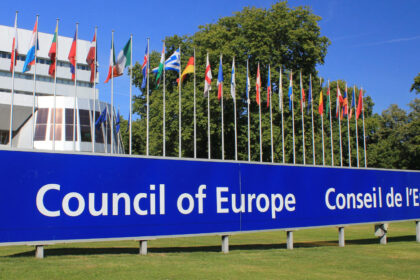Megi Diasamidze’s action is neither a crime nor an offense. At most, a civil lawsuit could have been filed against her, and that too only if the removal of the inscription from the poster required some expenses, such as the purchase of cleaning supplies – this is how Nana Kurdovanidze, Chair of the Georgian Young Lawyers’ Association, responded to the detention of 23-year-old Megi Diasamidze for allegedly damaging the election banner of “Georgian Dream’s” Tbilisi mayoral candidate, Kakha Kaladze.
As Kurdovanidze explains, an inscription made within the framework of freedom of expression, which does not leave a permanent mark on an object or can be easily removed without special effort, cannot be considered damage.
She further states that this action is not only not a crime, but not even an offense.
“Anything – whether it’s a banner or a poster – that depicts a candidate in the election and/or their ballot number, is considered campaign material.
During the pre-election period, there are rules for the placement of campaign materials. The municipal authorities determine the buildings and other places where campaign materials may be displayed. However, the Election Code strictly prohibits placing campaign materials on buildings with cultural heritage status.
The building at 12 Petre Melikishvili Street (the ‘Hotel Georgia’) is marked on the state-administered portal as an immovable cultural heritage monument. Therefore, placing campaign materials on this building is prohibited and can be assessed as a distortion of the building’s appearance. Distorting the appearance of a building is an administrative offense and leads to the fining of the person who posted the banner.
Accordingly, the banner for the alleged damage of which a 23-year-old student was detained under criminal law, may itself be considered an illegally displayed election banner.
As for whether damaging an illegally placed banner can be considered a criminal act: according to information released by the Ministry of Internal Affairs, the student was detained under Article 187 of the Criminal Code, which refers to damaging or destroying another person’s property in a way that causes significant damage. In this case, the banner was not destroyed; it is still displayed. It cannot even be considered damaged, since the inscription made on it was quickly and easily removed.
An inscription made within the framework of freedom of expression, which does not leave a permanent mark on an object or can be easily corrected without particular effort, cannot be considered damage.
Therefore, this action is not a crime, nor even an offense. If removing the inscription required the purchase of cleaning materials, and the owner incurred that expense, they could have calculated it, presented proof of purchase, filed a civil lawsuit in court, and demanded reimbursement of those costs. The case could have taken months or even years to be resolved, just as many citizens today wait for the delayed consideration of their cases in court,” – Kurdovanidze stated.
The head of GYLA: Megi Diasamidze’s action is neither a crime nor an offense – an inscription made within the framework of freedom of expression, which does not leave a permanent mark on an object, cannot be considered damage












